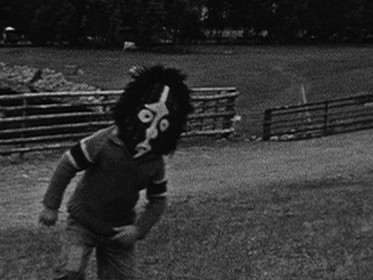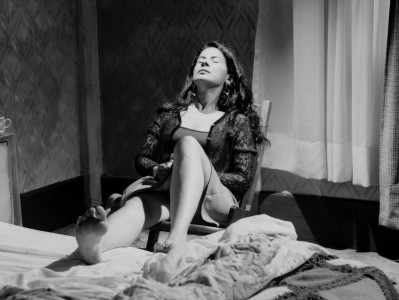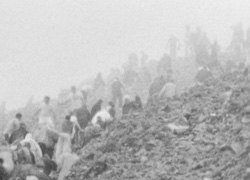
An Evening with Ben Rivers introduction and discussion with Haden Guest and Ben Rivers.
Transcript
October 12 2009, Harvard Film Archive presented short films by Ben Rivers. This is the recording of the introduction and Q&A that followed. Those participating are filmmaker Ben Rivers and HFA director Haden Guest.
[APPLAUSE]
Haden Guest 0:24
Thank you, Ben. I want to start by thanking the man at the very, very back of the room, John Quackenbush, our projectionist for doing such a crack job with these two CinemaScope films. As I mentioned before, this is a debut of our new lens, the first time we're actually projecting 16 Cinemascope during my time here. I also neglected to thank Jeff Silva of Balagan fame for his help and bringing Ben here. Thank you, Jeff. Ben, let's start by talking about Liberty which is perhaps your best known work to date. Now you said when you had your first encounter with Stuart, you weren't sure if there was a film there. Now what seems to be a pretty extraordinary family and setup here -- the iguanas, the dogs, the Land Rovers -- I mean did you know right away that you had a film here?
Ben Rivers 1:25
Yes, we'll be [INAUDIBLE] answer to that.
Haden Guest
Right.
Ben Rivers
I mean, I've been carrying around this anamorphic scope lens for a few years as well, kind of waiting for the right moment to make a film in scope. And as soon as I drove up that road and saw that place I knew that this was a place for that kind of format. It's kind of, you know, there’s a bit of Wild West there and as you know, it's got an epic kind of quality to it -- the landscape -- and also a kind of post apocalyptic feel which kind of lends itself to that format as well, so yeah, I was pretty certain there was a film straight away.
Haden Guest 2:20
I was gonna ask about scope as well just because it seems that it's so perfect for this, you know when the chickens walk all the way across the screen, or the horses, or even that go kart made for two, even that moment seems so perfect for the widescreen format. Now, a film like this, how long were you with this, with the family in order to get this and to sort of understand the rhythm of their lives and capture what you put together?
Ben Rivers 3:01
Well, like with Stuart, I went, I think I ended up going . . . I'm not entirely sure whether it's four or five times, and each time I'd stay for maybe a week, ten days or something and would stay there. Then they had a spare... I stayed in one of their spare caravans. I camped one time. So yeah, I try and really stick around and help out when I can and just watch: watch things happen and just kind of have my camera ready all the time or set up the sound recorders. I'll just kind [UNKNOWN] just to get general. So I kind of wander around with it. I kind of record the sounds in the same way that I record the images; just kind of walking and looking and listening and sort of waiting until something because... they were really happy and as soon as I turned up, I told them that I was a filmmaker and I was interested in making a film and they were really totally open and, you know, film what you like and as I gradually got to know them better through repeated visits I told them that I was going to cut out the adults, and it's going to be really concentrating on the children and in some ways I might be making it look like they were there on their own. And the parents were happy with that. They thought it was kind of funny... but very, very, very open people. They weren't worried about being kind of misrepresented or anything like that.
Haden Guest
Can you tell us something about the family, is this a working farm?
Ben Rivers
It's a kind of working farm, but it's fairly for themselves like, you know, it's not like there are those sheep they're not like this is you know there are small numbers of animals so it's not like it's a business for the outside. One of the ways they do make money is those ponies, they take people pony trekking in the highlands and the dad does a lot of those different jobs around. So it's either they've got loads of jobs and there's different things that they do to kind of keep that lifestyle going, you know.
Haden Guest 6:02
There is a speech made at one point it was difficult for me to grasp entirely but nevertheless certain words were really evocative. Who's speaking then and what...
Ben Rivers 6:16
That's Sarah who’s the oldest child. She was 12 at the time.
Haden Guest
Was she reading a text?
Ben Rivers
She was reading it over the phone. This is the first time I did a phone reading and yeah, you know, it does bother me that it's not a brilliant sound recording, but she didn't really want to -- she was a bit bashful about being on film. But I really wanted her in the film.
She's really important. She's like 12 years old and had so many responsibilities around the farm and a lot of looking after the boys and she’d cook everyone breakfast and make sure that the tractors have diesel in them and stuff like that, you know, and she's like a kid, you know. She also wants to have time reading, you know, pop magazines and stuff like that. She seemed, like, really important to be present. And so one of the visits I made up there I just happened to be reading this book by a French writer called Robert BJ. It's a book called Bagger and it's about a king who goes off -- he leaves his kingdom to go and live in the wild. So that those lines are actually from that book and the title as well. He's kind of going on liberty and he’s talking about his sort of, you know, leaving his responsibilities, certain kinds of responsibilities behind. Yeah, kind of intellectual responsibilities.
Haden Guest 8:17
Now the new film I Know Where I'm Going you have again made this series of portrait films where you're focusing pretty intensely, exclusively on an individual group of individuals in the case of Our Liberty, this decision to make a triptych, this was a road movie. Where did this come from? How did you resist the temptation to fully immerse yourself entirely within exclusive worlds?
Ben Rivers 8:48
I think well, it was an experiment really to . . . well, I got offered, kind of out of the blue, a commission. And the commission was to make a film, and it had to be a journey through Britain.
So the only brief was there to be a journey through Britain and it was enough money for me to want to accept that brief. So I thought it would be a good experiment to see what I could get relying almost completely on serendipity. And so just heading out one day sort of knowing that I'll be sort of on the road for a month or so and seeing what I could get with really fleeting visits to people. I would just spend, you know, maybe an afternoon even. So I've already thought even when I'm spending weeks and weeks with people, I kind of wonder about the you know -- I talked about it the other night -- that this kind of portrait aspect and how it's kind of impossible however long you spend with somebody to make a really accurate portrait, so they become more about that particular instance: me, the camera, that particular person. So this is kind of pushing that a bit further so that those meetings are even more fleeting and kind of fragmentary. So, and some of them will be, you know, I saw quite a lot of people on that journey, and some of them weren’t successful. I met a few women as well and I was really kind of excited to have women in my films because all these films I've been making about people living in the wild have all been with men and it's not that it's really been an issue for me that I had to do that but I was interested to find women. Basically neither of them wanted to be actually films. We had really great afternoons and good talks but they didn't want to be filmed. So that was kind of a shame. So yeah, that's...
Haden Guest 11:39
And how did the trip, how did you go from one point to another from one encounter to another? Were you guided by, I mean you knew where you were, I mean, did you, like in the title, know where you were going?
Ben Rivers 11:49
I just knew the destination which was the Isle of Mull. So the Isle of Mull is an island off of Scotland, which was the place that was where a film in the 40s called I Know Where I’m Going was set by Powell and Pressburger, which is a film I really like and I like the title for it. I had to come up with a synopsis for it, like a proposal for the film really quickly. So I just had to come up with a destination. Because if you're going on the road, you kind of need a destination. So it's, it's kind of, you know, it worked. And that left me completely open to like meander through the country from London up there, any which way and just see what happened on the way. And for the first time I kind of traveled with somebody, you know, I usually make films alone, but I went with my friend George cuz I knew his [UNKNOWN]. Yeah.
Haden Guest 12:59
Okay, now I need to actually figure in the film, which is also quite unusual. Let's see if we have any questions from our audience tonight. Any questions for Ben? Yes, here we have one here. Here comes a microphone.
Audience 13:20
I noticed that in the last film that you did, it seemed like it was the only time you recorded sound while you were filming. I was wondering if you noticed a big difference in the relationship you had with, like, what you were filming and the people you were filming when you had a second person with you?
Ben Rivers 13:41
I think that yeah, the kind of dynamic was a little bit different. But George is kind of similar to me in some ways, and we're really close friends. So, it didn't really change it that much though with the sync sound, that's something that I'm kind of, I don’t know, I'm just sort of tentatively experimenting with and I think it will change the way the films are, but I don't want to do it all the time. I kind of really like the way it makes, you know, the kind of creative way it makes you think when you don't recall things at the same time, you know, and how that kind of forces you to try out unexpected things. So, yeah.
Haden Guest 14:44
Anything, any other questions, comments? If not.... oh, here we... yes, great.
Audience 14:58
I was just wondering why you switched to color on the last one, why you chose to work in color?
Ben Rivers 15:06
Well, I kind of move between black and white and color a bit, but most of the film... while a lot of my films have been in black and white and I mean, it's partly that I was getting overly comfortable using black and white. I think I was using it slightly as a, you know... You kind of stick to your...
Haden Guest 15:19
Your default.
Ben Rivers 15:20
Yeah. And so with Origin of the Species and with I Know Where I’m Going they were kind of really deliberate attempts to see what I could do with color. And I think with the last one, I really wanted it to be super saturated and so I was using this really nice Fuji film stock that a lot of music video makers use because it really makes these kind of primary colors kind of pop out. [UNKNOWN]
Ben Rivers 16:05
Well, I mean, I didn't have a particular plan or structure, I just knew that I wanted it to be kind of I mean, I wanted it to have a bit of a hyper something to the color. I wanted things to be kind of exaggerated in it in that sense, in that film. You know, I wanted it to seem like it could be some future Britain where everyone's kind of disappeared or something. So I wanted it to have a kind of sci-fi feel to it in a fairly loose kind of way.
Haden Guest 17:02
Okay, well, please join me in thanking Ben Rivers. Thank you, Ben.
[APPLAUSE]
© Harvard Film Archive
Related film series
Explore more conversations
Arturo Ripstein and Paz Alicia Garcíadiego

Luther Price
Zelimir Zilnik


